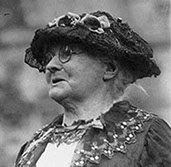
Working Womenʼs History Project
Connecting Today with Yesterday
Making Women's History Come Alive
Who We Are
We give the Mother Jones Award to the individual who exemplifies the traits of Mother Jones: her courage, her passion and her commitment to Workers Rights.

Working Women’s History Project Award: A “Mother Jones” Award
“Mother” Jones’ life symbolizes a determination to fight for social justice. ” . . . Crudely, imperfectly, but with a strong voice, she told of the excluded, remembered their suffering, and offered hope for their redemption.” (Elliott Gorn, Mother Jones: The Most Dangerous Woman in America, New York: Hill and Wang, 2001, 286)
Mary Harris (Mother) Jones: c. 1837-1930
Who was “Mother Jones”?
According to a West Virginia District Attorney, Reese Blizzard, Mother Jones was “the most dangerous woman in America”. According to Clarence Darrow, she was “one of the most forceful and picturesque figures of the American labor movement.”
While Mary Harris claimed 1830 as her birth date, researchers suggest that it was more likely 1837, in County Cork, Ireland. Her family emigrated to Toronto, Canada, when she was a child. She trained to be a teacher at Toronto Normal School from 1858-1859, and worked briefly as a teacher and as a dressmaker. In 1861, Mary Harris married George Jones, an iron molder and union organizer in Memphis, Tennessee. The couple had four children – but all four children, and Mary’s husband, died in the yellow fever epidemic of 1867.
Mary Jones returned to Chicago, where she worked as a dressmaker until her shop was destroyed in the Chicago fire of 1871. During her years as a dressmaker in Chicago, she became increasingly aware of the disparity of wealth between the rich, whom she sewed for, and the poor. She was also deeply affected by the Haymarket Riot of 1886 which was a demonstration for the eight hour day. In solidarity with this event she moved her birthday to May 1st. Mother Jones became increasingly active in the union movement in her late 50s. Her white hair and external grandmotherly demeanor earned her the name “Mother,” one she embraced. A fiery orator and a fearless fighter for workers’ rights, she inspired people. She organized in the coalfields of Pennsylvania, West Virginia, and Colorado. In 1903 to protest child labor, she led a children’s march of 100 children from the textile mills of Philadelphia all the way to President Theodore Roosevelt’s Long Island home. In 1924 she made her last strike appearance in Chicago in support of striking dressmakers.
In her long life, she was arrested many times, banished from many towns and held incommunicado in more jails in more states than any other union leader of the time. Her motto was: Pray for the dead and fight like hell for the living!
Awards Given by the Working Women’s History Project & its predecessor, the Women and Labor History Project
(Unless otherwise designated, all the awards are Mother Jones Awards.)
Year
Awardee
2009 Research Award
Gwen Jordan, formerly Gwen Hoerr McNamee, received an award for her research in compiling and editing Bar None: 125 Years of Women Lawyers in Illinois, a 1999 project of the Chicago Bar Association Alliance for Women. Gwen Jordan is a Visiting Assistant Professor at Northern Illinois University in the Department of Sociology.
2007
Lauren Sugerman, who co-founded Chicago Women in Trades (CWIT), received the Mother Jones Award for her pioneering work in establishing an organization that encouraged women to enter into the higher-paid, challenging trades, supported and advocated for them, and brought legal pressure to encourage more equitable hiring practices.
2006
Katie Jordan was the first African-American tailor fitter at Lytton’s Department Store in Chicago. She is a lifelong union activist and organizer of the Amalgamated Clothing Workers and later in Workers United. She is President of the Coalition of Labor Union Women, Chicago Chapter.
2005
Sharon Williams was a Congress Hotel Worker and loyal member of UNITE HERE Local 1 who acted as a leader during the Congress Hotel strike.
2004
Alice J. Dan is a leader in fostering equality for women in the sciences. She was the founding director of the Center for Research on Women and Gender at the University of Illinois at Chicago.
2003
Reverend Addie L. Wyatt was the first female president of a local chapter of the United Packinghouse Workers of America. She was a civil rights activist and co-founder of the Coalition of Black Trade Unionists and of the Coalition of Labor Union Women. She was an early supporter of the National Organization for Women and served on the President’s Commission on the Status of Women.
2002
Yolanda “Bobby” Hall, was a lifetime activist committed to the union movement. She was the first woman hired for the tool room at Bendix Aviation during WWII and became president of Local 330 of the United Auto Workers. After WWII she taught preventive medicine at Rush Medical College as an assistant professor. She founded the Women and Labor History Project in 1995, and remained active in supporting the Lincoln Brigade.
2001
Historian Rima Lunin Schultz is one of the two editors of Women Building Chicago 1790-1990: A Biographical Dictionary, a 10-year-project of the Chicago Area Women’s History Council, which has served as an important resource to WWHP. Schultz has also authored or edited several other books, primarily about the immigrant experience in Chicago.
1999
Marjorie Stern, teacher, AFT organizer and field representative, played an influential role in establishing the AFT Women’s Rights Committee on which she served as chairwoman from 1971 until 1974. Stern coordinated the task force on union women for the National Organization for Women and represented teachers on national committees of the Coalition of Labor Union Women.
1999
Karen Asuncion was Assistant General Chair of District 141 of the International Association of Machinists and a member of the negotiating committee. As part of a record number of women who joined this union, she collaborated with WLHP in having women in the union write their own stories and record this experience.
1997
Helen Ramirez-Odell, is a school nurse who chairs the Chicago Teachers Union Women’s Rights Committee and helped found the Women and Labor History Project. She represents school nurses in Chicago Teachers Union and is an AFT delegate to the CLUW National Excecutive Board where she chairs the Women’s Health Committee.
1997 Special Oral History Award
Elizabeth “Betty” Balanoff, directed the Labor Oral History Project at Roosevelt University from 1970-1985 during which she conducted and transcribed a series of interviews with both rank and file union members and labor leaders in the Chicago area.
1996
Sandra Ellison was an activist with her union, Office and Professional Employees International Union, Local 28, as well as with the Chicago branch of the Coalition of Labor Union Women.
1996 Special Oral History Award
Mollie West, International Typographical Union and Illinois Labor History Society, and Vicky Starr, United Packinghouse Workers of America and International Brotherhood of Teamsters, two stalwart workers in the labor movement, were offered special birthday recognitions at WLHP’s first gala.
© 2018—Working Women's History Project